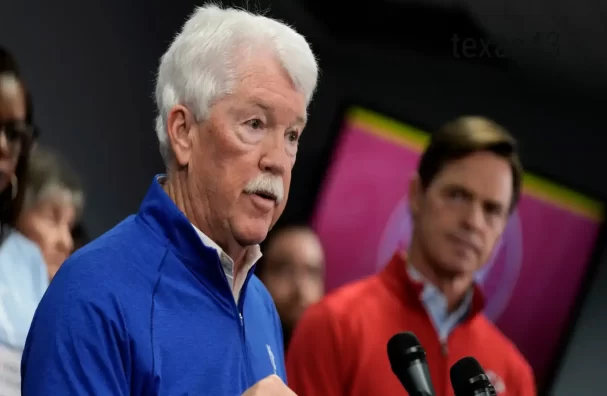
The Chiefs and the Royals, hangs in the balance following a resounding rejection of a sales tax initiative. Designed to fund a brand new downtown ballpark and major renovations to Arrowhead Stadium, this measure was turned down by Jackson County’s residents, casting a shadow of uncertainty over the teams’ future in the city.
The proposed tax plan, ultimately rejected by more than 58% of voters, was intended to replace the existing three-eighths of a cent sales tax. This tax has been financing the maintenance of Truman Sports Complex, the historic home of both Kauffman and Arrowhead stadiums, for over half a century. The new tax would have been in effect for the forthcoming 40 years.
The Royals had committed to contributing a minimum of $1 billion from their ownership towards their project. They planned to use their share of the tax revenue to help finance a ballpark district costing over $2 billion.
On the other hand, the Super Bowl-winning Chiefs had pledged $300 million in private funds. Their share would have been utilized as part of an $800 million comprehensive renovation of Arrowhead Stadium.
In the wake of the vote, John Sherman, Royals owner, and Mark Donovan, Chiefs president, expressed their disappointment. They acknowledged the failure of the initiative long before the final tally.
Sherman, deeply rooted in Jackson County, expressed his belief in the betterment of the region with the presence of both teams. On the other hand, Donovan stated the Chiefs would act in the best interest of their fans and organization moving forward.
READ ALSO: Kansas City Chiefs Super Bowl Parade Shooting: What We Know So Far
This could mean a multitude of things: the Chiefs could revise and try again with a more voter-friendly plan, change their funding approach to include more private investment, or even entertain offers from competing cities and states willing to provide the public funding they seek.
The current lease at Truman Sports Complex is set to last through January 31, 2031. Sherman stated that the Royals would not play at Kauffman Stadium beyond the 2030 season, but the Chiefs remain hopeful of staying at Arrowhead Stadium.
The proposed stadium plans faced significant public opposition from the outset, as transparency was lacking, and concrete plans were not presented before voters.
Last fall, the Royals revealed two potential locations for their ballpark district. These locations were on the eastern edge of downtown and across the Missouri River in Clay County, Missouri. However, after failing to finalize their location by their self-imposed deadline, they discarded these plans in favor of a different downtown spot.
This new area, known as the Crossroads, is a vibrant hub of arts and restaurants. It is located close to the T-Mobile Center, the bustling Power & Light entertainment district, the Kauffman Center for the Performing Arts, and the 18th & Vine district, which houses the Negro Leagues Baseball Museum.
Despite the location reveal, the plans remained vague. Last week, the Royals had to update their latest ballpark renderings, keeping a major street open as per Kansas City Mayor Quinton Lucas’ request.
Kansas City residents and businesses voiced concerns about the proposed location. Established businesses were worried about the potential disruption, and some landowners in the Crossroads have yet to reach sales agreements with the club.
The Royals’ executive vice president, Sarah Tourville, stated that the goal was to move into the new stadium by opening day in 2028. The Royals moved to Kauffman Stadium in 1973, which underwent extensive renovations from 2009-12.
Similarly, Arrowhead Stadium was built alongside Kauffman Stadium and also experienced renovations around the same time.
The Chiefs proposed a renovation that would impact every aspect of their 52-year-old building, from the seating bowl to luxury amenities to the tailgating scene. However, they would not be willing to sign a lease for another 25 years without the financing to properly renovate and reimagine the stadium.
The Chiefs hoped their recent successes, including three Super Bowl titles in the past five years, would sway voters in their favor. However, the rejection of the tax plan has left their future in Kansas City uncertain.
As the city navigates this challenging time, the Chiefs and Royals’ fate remains a hot topic. Whether they stay or go, their legacy in Kansas City is undeniable. In the meantime, the teams, the fans, and the city are left to wait and see what the future holds.
